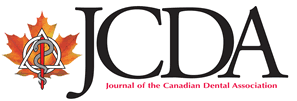 |
Current Issue | Subscriptions | ||||||
| Back Issues | Advertising | |||||||
| More Information | Classified Ads | |||||||
| For Authors | Continuing Education | |||||||
|
||||||||
 |
|
Early Childhood Caries and Access to Dental Care among Children of Portuguese-Speaking Immigrants in the City of TorontoFULL TEXT
• Renata I. Werneck, DDS, MSc • A b s t r a c tMethods: This population-based case–control study involved 52 ECC cases and 52 controls (i.e., without ECC) identified from community centres, churches and drop-in centres by a process of network sampling. Caries status (dmft/s) was assessed by clinical examination. Access to dental care and risk factors for ECC were determined through a structured interview with the Portuguese-speaking parent. Results: Forty (77%) of the children with ECC but only 28 (54%) of controls had never visited a dentist. Thirty (58%) mothers of children with ECC but only 13 (25%) mothers of controls had not visited a dentist in the previous year. Bivariate analyses revealed that low family income, no family dentist, no dental insurance, breastfeeding, increased frequency of daily snacks and low parental knowledge about harmful child feeding habits were associated with ECC. Non-European-born parents and parents who had immigrated in their 20s or at an older age were 2 to 4 times more likely to have a child with ECC than European parents and those who had immigrated at a younger age. Lack of insurance, no family dentist and frequency of snacks were factors remaining in the final logistic regression model for ECC. Conclusions: The strongest predictors of ECC in this immigrant population, after adjustment for frequent snack consumption, were lack of dental care and lack of dental insurance. These findings support targeting resources to the prevention of ECC in children of new immigrants, who appear to experience barriers to accessing private dental care and who are exposed to many of the determinants of oral disease.
|
|
|
Full text provided in PDF format |
|
| Mission Statement & Editor's Message |
Multimedia Centre |
Readership Survey Contact the Editor | Français |
|